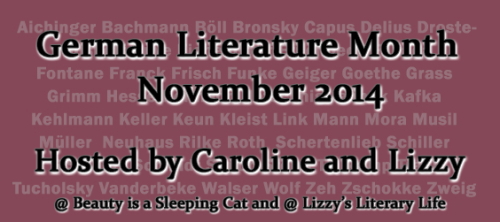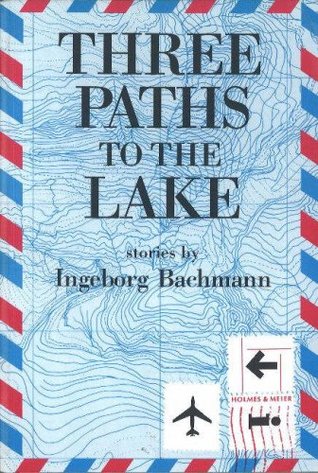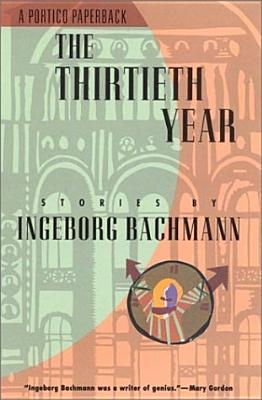German Literature Month hosted by Caroline from Beauty is a Sleeping Cat and Lizzy from Lizzy’s Literary Life every November is one of my favourite reading events of the year. This year we are celebrating the 10th edition. I was looking forward to reading lots of German literature this month. But things didn’t go according to plan. I tried reading slowly, then I tried forcing myself to read, but it didn’t work. Three weeks of the month have already gone, and I’ve read a few pages from multiple books. This is not how I expected the 10th anniversary celebrations to go. I am disappointed with myself. But I’m not giving up. I have participated in every edition of German Literature Month and I am not going to miss it this time. I decided to participate in a different way this year.
I thought as my first post this year, I’ll write about my favourite German poems. I haven’t read a lot of German poems, and I don’t know many readers who have read German poems. But I’ve read some, and I’ve loved them. I’m sharing some of my favourites below.
Hermann Hesse
One of my friends gifted me this poetry collection by Hermann Hesse. I love Hesse’s novels and he is one of my favourite writers, but I didn’t know that he wrote poetry. I was pleasantly surprised when I read this book and I loved it.

These lines from one of the poems, make me remember my mother, and always make me cry.
“But the mild night,
That bows with its gentle clouds above me,
Has my mother’s face,
Kisses me, smiling, with inexhaustible love,
Shakes her head dreamily
As she used to do, and her hair
Waves through the world, and within it
The thousand stars, shuddering, turn pale.”
These lines are very poignant.
“And one day you will know
That the sweet breath of this life,
The precious possession of the heartbeat,
Is only a loan”
These lines are thought-provoking.
“And that for every hair on your head
Somebody endured one struggle, one pain, one death.”
And these lines are beautiful and insightful.
“But sleep has turned into a frightened bird,
Difficult to catch, to hold, yet easy to kill;”
Clearly, Hesse is as wonderful a poet, as he is a novelist.
Nelly Sachs
Nelly Sachs is nearly forgotten today. No one knows her. No one remembers her. Except for a few fans like me. This was how she lived most of her life. No one knew her. She was an obscure German poet, who lived in Sweden. Then for a brief period she shone brightly like a star, when she won the Nobel Prize for literature, and then she was promptly forgotten again. I discovered her by accident, and when I saw her photo it was love at first sight – it was like looking at a photo of my mother or my favourite aunt or my favourite teacher. I didn’t care how good her poetry was, I just loved her. Then I read about her and the difficult times she went through and I loved her even more. Then I read her poetry and it was so moving and heartbreaking that I cried.

Many of her poems are about the Holocaust, some of them are about the butterfly and metamorphosis and many of them have an underlying Jewish theme. I’m sharing one of my favourite poems of hers, here. It is beautiful and heartbreaking.
If I Only Knew
If I only knew
On what your last look rested.
Was it a stone that had drunk
So many last looks that they fell
Blindly upon its blindness?
Or was it earth,
Enough to fill a shoe,
And black already,
With so much parting
And with so much killing?
Or was it your last road
That brought you a farewell from all the roads
You had walked?
A puddle, a bit of shining metal,
Perhaps the buckle of your enemy’s belt,
Or some other small augury
Of heaven?
Or did this earth,
Which lets no one depart unloved,
Send you a bird-sign through the air,
Reminding your soul that it quivered
In the torment of its burnt body?
Georg Trakl
I discovered Georg Trakl’s poetry through Melissa’s (from ‘The Book Binder’s Daughter’) post on it. Then I got his collection ‘Sebastian Dreaming‘ and have been dipping into it ever since.

Trakl was an Austrian poet. He died very young, when he was 27, at the beginning of the First World War, and left behind a slim collection of poetry, most of which has been translated into English only recently. One of my favourite poems from this collection is this one. It paints a beautiful picture of autumn.
Landscape
September evening; the dark calls of the shepherds echo mournfully
Through the darkening village; fire sprays inside the forge.
A black horse rears enormous; the hyacinthine curls of the country girl
Play for the ardour of his crimson nostrils.
The call of the doe quietly freezes at the edge of the forest
And the yellow flowers of autumn
Bend speechless over the blue face of the pond.
A tree bursts into red flames; the bats flutter upward with black faces.
Ingeborg Bachmann
I discovered Ingeborg Bachmann through Caroline from ‘Beauty is a Sleeping Cat’. (This is Ingeborg Bachmann week. Do check out Caroline’s beautiful tribute to Ingeborg Bachmann here.) Before long, dear Inge became one of my alltime favourite writers. I read most of Inge’s short stories and novellas and loved them all. She writes incredibly beautiful prose which is also intellectually demanding. There is a novel of hers, ‘Malina‘, which I haven’t read yet, and which I’ve kept aside for a rainy day. Inge, before she started writing stories, was a poet. She was an incredibly beautiful poet. I dip into her poetry collection once in a while, and read a poem or two. I don’t want to finish reading it. This is one of my favourite poems from her collection ‘Darkness Spoken‘. I think this is the complete collection of her poetry in English. It is sad that Inge left just a very slim literary output. I wish there was more. But what she has bestowed on us, is beautiful, incredibly beautiful.

No Delicacies
Nothing pleases me anymore.
Should I
fit out a metaphor
with an almond blossom?
crucify the syntax
upon an effect of light?
Who will rack their brains
over such superfluous things –
I have learned an insight
with words
that exist
(for the lowest class)
Hunger
Shame
Tears
and
Darkness.
With unpurged tears,
with despair
(and I despair in the face of despair)
about so much misery,
the sick pay, the cost of living,
I will get by.
I don’t neglect writing,
but rather myself.
The others are able
God knows
to get by with words.
I am not my assistant.
Should I
arrest an idea, lead it off
to a bright sentence cell?
feed sight and hearing
with first-class word morsels?
analyze the libido of a vowel,
estimate the collector’s value of our consonants?
Must I
battered by hail,
with the writing cramp in this hand,
under the pressure of the three hundredth night
rip up the paper,
sweep away the scribbled word operas,
annihilating as well : I you and he she it
we you all?
(Should? The others should.)
My part, it shall be lost.
Johann Wolfgang von Goethe
I’ll sign off with one of my favourite German writers Goethe. I love Goethe’s novels. I started reading his masterpiece ‘Faust‘ this month and it is beautiful. These lines are from the early part of the book.

Mephistopheles’ dark humour made me smile 😊 What he says also seems to mirror the extraordinary situation of our world today.
The Lord :
“Why are you telling me all this again?
Do you always come here to complain?
Could there be something good on earth that you’ve forgotten?”
Mephistopheles :
“No, Lord! I’m pleased to say it’s still completely rotten.
I feel quite sorry for their miserable plight;
When it’s as bad as that, tormenting them’s not right.”
Have you read any of these poems? Do you like German poems? Which are some of your favourites?





